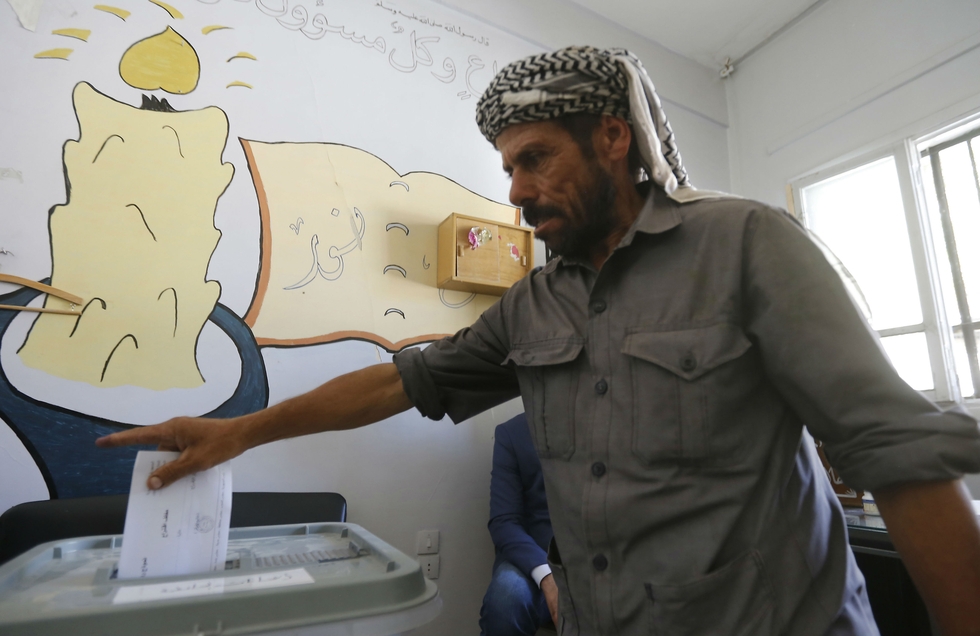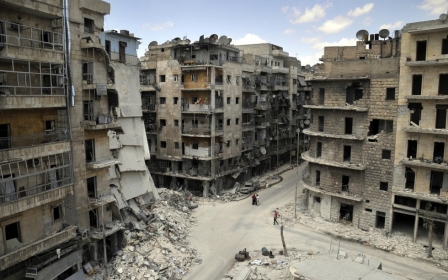Kurds refuse to take part in polls in first local elections in Syria since 2011

Syria is holding its first municipal elections since 2011 amid tensions with the country's self-administered Kurdish region, which is refusing to allow polls to take place.
Polls opened on Sunday in government-controlled areas, with more than 40,000 candidates standing for 18,478 council seats, according to the Ministry of Local Administration.
The Kurdish-led self-administration is refusing to include north Syria in the elections.
Its officials say they want a federal Syria that respects their autonomy from Damascus, the AP news agency reported.
Seven years since the last vote, when the country's uprising erupted against President Bashar al-Assad's rule, the conflict has killed more than 360,000 people, forced millions more to flee and left the economy in tatters.
Now, Syrian troops are back in control of around two-thirds of the country after a string of victories, most recently around Damascus and in southern Syria.
Nearly 12 million people out of a pre-war population of 22 million who have been either internally displaced or made refugees outside the country were unable to vote, Deutsche Welle reported.
Polling booths opened at 7am local time (04:00 GMT) across government-held parts of the country and will be open for 12 hours, with a potential five-hour extension depending on turnout, the state news agency SANA reported.
In Damascus, election posters mostly featuring incumbents were plastered across public squares, including in the Old City, the AFP news agency reported.
There appeared to be fewer people heading to the polls than in previous presidential or parliamentary elections, particularly as Sunday was a regular work day.
'Why vote?'
Mohammad Kabbadi, a 42-year-old government employee, cast his ballot in the Bab Sharqi district of the capital for a candidate from his neighbourhood.
"I know exactly who I am going to vote for - he's young, active and his victory will bring good things to residents of this area," said Kabbadi.
A vast majority of the candidates are members of the ruling Baath party or affiliated to it, which deterred some people from casting their ballot.
"Why vote? Will anything change? Let's be honest," said Humam, a 38-year-old working in the capital's Mazzeh district who opted to stay at home on Sunday.
"Everyone knows the results are sealed in advance for a single party, whose members will win in a process that's closer to an appointment than it is to an election."
Council members serve four-year terms at the municipal level and are mostly responsible for service provision and other administrative matters.
Those elected in this round are expected to have more responsibilities than their predecessors, particularly linked to reconstruction and urban development after the destruction wrought in the country.
Syria last held local elections in December 2011, just nine months into the conflict.
It held parliamentary elections in 2016 and a presidential vote in 2014, labelled a "disgrace" by the US, that renewed Assad's hold on power for another seven years.
Sunday's voting is taking place as pro-government forces continue to amass around Idlib, the largest rebel-held piece of territory, ahead of an expected assault on the northwest province.
Stay informed with MEE's newsletters
Sign up to get the latest alerts, insights and analysis, starting with Turkey Unpacked
Middle East Eye delivers independent and unrivalled coverage and analysis of the Middle East, North Africa and beyond. To learn more about republishing this content and the associated fees, please fill out this form. More about MEE can be found here.




